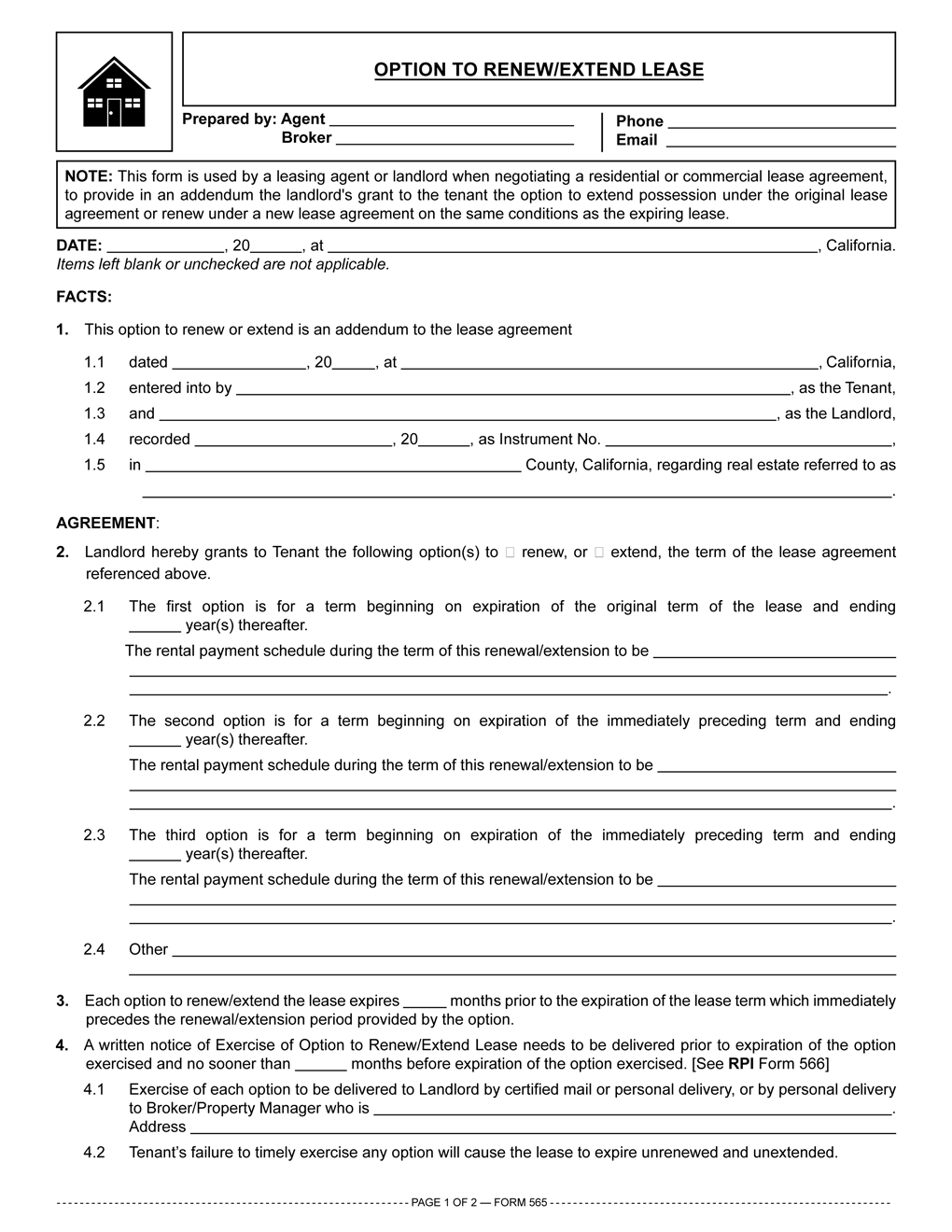Benefits for the tenant and landlord
Tenants frequently negotiate lease agreements with provisions or addendums which allow the tenant, on proper notice, to continue in lawful possession of the unit after the current lease term expires. An agreement allowing continued occupancy of a rented premises is called an option to renew/extend a lease. [See RPI Form 565]
For a commercial or residential tenant, a lease renewal/extension option is a financial imperative. The option gives the tenant time to determine whether:
- the economic and financial conditions of their trade, business or residency at this location favor continued possession, and when they are, they exercise the option and remain; or
- the premises are not what they need for the future and they vacate the premises on expiration of the lease as they are not obligated to remain.
The well-informed tenant will consider negotiating an option to remain in possession for one or more consecutive renewal/extension periods when entering into a lease agreement rather than agreeing to a singular long-term lease. The tenant is under no obligation to exercise the option and benefits from the flexibility of remaining or not. [See RPI Form 565]
The landlord also benefits from an option to renew/extend. A renewal option encourages a tenant to enter into the lease since it affords the tenant the right to continue in possession when the property proves beneficial to their business or as their place of residence.
Additionally, the renewal/extension option encourages the tenant’s enhancement and promotion of the property in anticipation of being able to remain in possession. Thus, the option is both an inducement to let and an inducement to stay. [See RPI e-book Real Estate Property Management, Chapter 48]
Renew vs. extend
A technical but critical distinction exists between the extension and a renewal of a lease.
An extension lengthens the original lease term while retaining all aspects and conditions created by the original lease agreement. On exercise of the option to extend, the date for expiration of the current term for occupancy stated in the lease agreement is modified, extending the term for the additional period provided by the option agreement.
A renewal requires the tenant and landlord to enter into a new lease with conditions identical to the original lease agreement. Thus, a renewal is not a continuation of the old lease but is a new lease agreement with a new starting date. [In re Marriage of Joaquin (1987) 193 CA3d 1529]
The new tenancy created by the new lease agreement is subject to any change in law affecting the rights and obligations of the landlord or tenant since entering into the original lease agreement.
More importantly, the new lease is subordinate to any encumbrances — mortgages, judgments or tax liens — which were recorded during the term of the prior lease. This creates a precarious situation for the tenant since the recording documents give others’ rights which now have priority over the new lease agreement — rights to the property sandwiched between the landlord’s fee rights and the tenant’s new leasehold rights to occupancy.
An extension merely modifies the original lease by extending its expiration date. The modified lease is not subject to changes in the law or encumbrances occurring during the term of the original lease. [See RPI Form 550 – 552-4]
However, the terms “extension and renewal” are not interchangeable. Confusing an extension with a renewal — and vice versa — muddles a landlord’s or tenant’s purpose, legal rights and the documentation required.
For instance, a lease agreement granting the tenant an “option to renew” that does not specify the manner or method for exercise of the option and does not call for the signing of a new lease is considered an extension of the original lease agreement.
As a result, the provisions and conditions created by the original lease apply to the continuing tenancy on exercise of the option, but with a new expiration date by modification. [In re Marriage of Joaquin, supra]
A leasing agent or landlord uses the Option to Renew/Extend Lease form published by RPI (Realty Publications, Inc.) when negotiating a residential or commercial lease agreement which is to provide for a renewal/extension option. It is an addendum to a lease agreement which grants the tenant the option to either extend possession under the original lease agreement or renew under a new lease agreement on the same conditions as the expiring lease. [See RPI Form 565]
Related article:
Is a lease agreement void when the term of the lease exceeds the rule against perpetuities?
Exercise of the option
When a tenant decides to exercise a lease renewal/extension option, the tenant needs to properly notify the landlord of their intention to renew or extend the lease on the exact same terms as contained in the option. The tenant is to deliver the notice to the landlord during the time period for exercise and be unequivocal in accepting the specific period offered in the option. A notice lacking these critical elements is ineffective and the landlord may ignore it. [See RPI Form 566]
Also, the tenant needs to comply strictly with a renewal/extension option agreement regarding the steps to be taken and the time period in which they are to occur to properly exercise the option.
When the tenant fails to perform any of the steps outlined in the option agreement, the option is not exercised, and the lease will expire at the end of its original term. [Bekins Moving & Storage Co. v. Prudential Insurance Company of America (1985) 176 CA3d 245]
Typically, a tenant is required to give written notice of their exercise of the option several months before the current term of the lease expires — typically a period of time ending three to six months before expiration of the current term of occupancy.
Advance notice requirements give the landlord ample time to locate a new tenant when the present tenant elects not to renew/extend the lease.
The option provisions further state the method for delivery of the tenant’s notice of their intent to exercise the option to renew/extend. The tenant needs to provide notice of the exercise in writing and personally hand it — or send it by certified mail — to the landlord within a specific period of time, such as three months, which closes three to six months prior to the expiration of the current lease term. [See RPI Form 566]
When the option agreement calls for the notice to be delivered by certified mail, the risk of the notice being lost in the mail is on the landlord. When a receipt for certified mail is issued by the post office, the tenant is no longer responsible for its physical delivery to the landlord. It is unnecessary to request a return receipt. [Jenkins v. Tuneup Masters (1987) 190 CA3d 1]
To prevent an unintended lease expiration (and loss of an additional fee), the tenant’s broker prepares and hands the tenant an exercise of option to renew/extend lease form or makes one available to the tenant during the window period for exercise of the option. [See RPI Form 566]
A tenant or their agent uses the Exercise of Option to Renew/Extend Lease published by RPI when they hold an option to renew or extend their lease term to exercise their option to occupy for the additional term. On proper delivery, it informs the landlord of the tenant’s intent to exercise the renewal/extension option on its terms and conditions, without qualification or equivocation. [See RPI Form 566]
The Exercise of Option to Renew/Extend Lease form provides the tenant with the paperwork needed to exercise the option.
Editor’s note — The option may include an extra step or activity requisite to the exercise of the option, such as the landlord requiring a substantial renovation of the leased premises in a given year as a condition to exercising the option to renew. When such an activity or step is required, it needs to be performed or properly addressed in the form used to exercise the option.
Typically, the broker’s fee arrangement on the original lease calls for a fee on any extension or renewal of the lease. Not only is the exercise by the tenant a benefit for the tenant, but the leasing agent also benefits by earning an additional fee for the renewal/extension. [See RPI Form 113 §2.2 and 3.1]
Related article:
Notice of option’s expiration
A leasing agent who negotiates an option to renew or extend on behalf of a tenant needs to consider arranging for the inclusion of a notice provision in the option requiring the landlord to give the tenant notice of the option’s expiration 60 to 180 days prior to the expiration of the option period for exercise.
This notice from the landlord to the tenant of expiration of the option eliminates the element of surprise for both the landlord and tenant.
The tenant’s inadvertent failure to exercise the lease renewal option may prove disastrous for the tenant who plans to continue in occupancy after the expiration of the original lease term.
When the landlord re-rents the premises to the existing tenant despite the tenant’s failure to exercise a renewal/extension option, the tenant will be forced to negotiate the terms of a new lease under contemporary market conditions — conditions potentially less advantageous to the tenant.
Thus, when availability of space is tight, the landlord may be in a position to take advantage of the tenant, an overreach situation a prudent landlord is careful to avoid.
Further, renegotiation of rent and lease terms on expiration of a lease often result in increased rental rates, higher common area maintenance (CAM) fees and other landlord charges.
Additionally, a landlord may impose changes in responsibilities for maintenance or property improvements on the tenant when negotiating a lease with the holdover tenant whose option to renew/extend expires unexercised. [Bekins Moving & Storage Co., supra]
Thus, a tenant’s broker needs to inform their tenant as to when and how the renewal option is to be exercised, and then provide the tenant with the necessary forms in a timely fashion. [See RPI Form 565 and 566]
Related article:
This article was originally published January 2016 and has been updated.
Want to learn more about lease renewals and extensions? Click the image below to download the RPI book cited in this article.

















